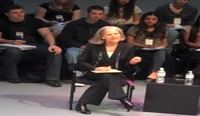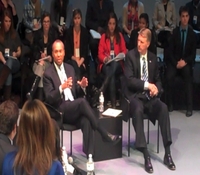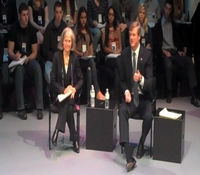
What does it take to build a green economy in Massachusetts? Emerson students had the opportunity to hear the gubernatorial candidates' suggestions at a debate on Oct. 15.
By Daniel Kobialka
12/6/10

Jill Stein takes green to the extreme in Massachusetts
The Green-Rainbow Party put its green where its mouth is to give candidate Jill Stein the opportunity to participate in the 2010 Massachusetts gubernatorial debates. Literally.
In September, a nine-member Boston media consortium sent Stein a letter telling her it planned to exclude her from the televised debates. "There are three insiders in this race, and one outsider," Stein said. "[The media] is a little bit afraid to have my voice in the race because it really is the voice of so many voters who are locked out."
Stein, a medical doctor, did not meet the consortium's financial requirement, and would need at least $100,000 to participate in the debates. But Stein's supporters had the cure, raising $131,000 in qualifying funds.
The Green-Rainbow Party, the Massachusetts division of the Green Party, promotes ecological issues such as creating green jobs and fighting climate change. Party candidates have made noise by commenting on controversial issues in the past. In September, Stein, a Lexington native, showed her support for the legalization of marijuana at the Freedom Rally held in the Boston Common.
Stein said her gubernatorial campaign emphasized an ecological approach to the economy. "We're talking about [creating] secure, good wage, green jobs across a whole spectrum," Stein said. "There are a whole slew of green jobs that basically pay for themselves because they reduce energy costs, improve our health and make our community stronger." The Lexington native said she has stressed the importance of green job creation in the Commonwealth in the fields of healthy food production and recycling in her campaign.
Stein admitted the campaign was not easy, but said she enjoyed interacting with voters. "You get your share of the back-biting stuff," Stein said. "[But] the really important thing is talking to voters and giving them a voice that they might not otherwise have."
Mike DeRosa, the Connecticut Green Party's 2010 candidate for Secretary of State, said the group is "marginalized" by the media. "We don't have an opportunity to really participate in any meaningful way in the dialogue in most campaigns that are run by Democrats and Republicans," DeRosa said. "[Green Party candidates] have to be persistent."
The party has reached out to younger voters with College Greens, a group that brings Green Party supporters together on college and university campuses. "[College Greens] tries to engage people under the age of 30," said Ron Hardy, a Green Party supporter. "The Green Party definitely needs younger blood, younger energy and new ideas instead of doing the same thing continuously."
Brian Bittner, office manager for the Green Party's national headquarters, said there are at least 25 College Green chapters nationally. "We're continuing to get resources together on municipal and county levels to grow," Bittner said. "Our goals for expanding the College Greens are more local." Bittner said party representatives anticipate 100 chapters nationally by the 2012 presidential election.
Stein and DeRosa failed in their quests to bring their green ideals to elective office in their respective states. Stein finished last in a field of four gubernatorial candidates in Massachusetts, while DeRosa received less than 14,000 votes.
Richard Duffee, co-chair of the Connecticut Green Party, said the group has international appeal, despite the lack of success of party candidates in the U.S. "[The party] is now in 80 countries around the world," Duffee said. "Most of them initially got involved because lots of people felt the environmental law in their countries wasn't working well or didn't exist."
But all was not lost for the Green Party in the General Election. The party achieved ballot status in Massachusetts, New York and Texas for the 2012 presidential election.The Massachusetts governor's race put the discussion of building a green economy in the spotlight. The four gubernatorial candidates each outlined ideas to create a sustainable economy.
Gov. Deval Patrick expressed a desire to continue to move forward with the proposed Cape Wind project, building an offshore wind farm off Nantucket Sound. "Cape Wind, for all of the thoughtful views on the other side of the question, is on balance good for us from an environmental, economic and energy point of view," Patrick said. "It is a very important symbol of the type of economy we're trying to grow."

Republican challenger Charlie Baker opposed the proposed 130-turbine wind farm. "I'm not against alternative energy sources at all," Baker said. "I'm against alternative energy sources that make the state less competitive so that we have a harder time creating jobs and getting those 300,000 people who are out of work back to work."
Baker promoted capitalizing on the use of Hydro-Quebec, a government-owned utility that could generate electricity from Canada to New England, as a healthy alternative to the Cape Wind project. "Hydro-Quebec is proven, sustainable, renewable and clean," Baker said. "And it can do five times the work of reducing our carbon footprint in Massachusetts as Cape Wind. That to me is a win-win."

Independent Tim Cahill stressed research in other sources, including nuclear, natural gas and land-based wind energy, to improve the state's economy. "We have some of the highest energy costs in the country," Cahill said. "That makes us less competitive."
Cahill said exploring the use alternative energy sources must be done with small businesses in mind. "If we do want businesses to grow, we cannot keep adding direct or green or hidden taxes," Cahill said. "[Implementing renewable energy] is a laudable goal, but we have to do it in a way that we can afford it."

Green-Rainbow Party candidate Jill Stein said she sees a need for using wind energy in Massachusetts, but expressed concerns over the cost for residents. "We really owe it to consumers that they're getting a good deal," Stein said.
Stein urged the development of community-based facilities to reduce energy costs in the Commonwealth. The Lexington native noted residential consumers would be charged 24 cents per kilowatt hour while municipal facilities would be provided wind energy at 7 cents per kilowatt hour. "It's going to be more expensive when you're offshore," Stein said, "but it shouldn't be three times more [expensive]."

The candidates provided plans to use a green economy to not only reduce costs, but also to create more jobs. Liz Andreozzi, Director of Policy & Research for Tim Cahill, said she believes state citizens must consider all costs involved in alternative energy. She added that creating green jobs in the Commonwealth is possible. "Green jobs are attainable, but they should not be the only jobs we strive to create," Andreozzi said.
Patrick received 48 percent of votes in the General Election to earn a second term as governor, receiving an opportunity to continue to build a green economy in the Commonwealth.
Walter Frick, program assistant for the New England Clean Energy Council, said Gov. Patrick can help young people become involved in building a green economy in his second term. "[Massachusetts] is banking on getting young people more seasoning in green business," Frick said. "Young people need to become more involved in building a green economy."
I like to party, not look articles up online. You made it hpaepn.